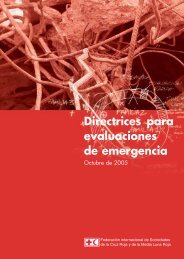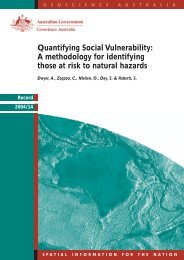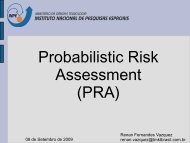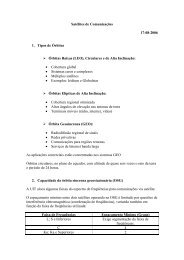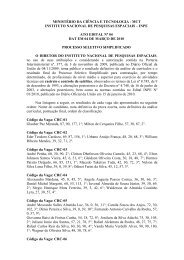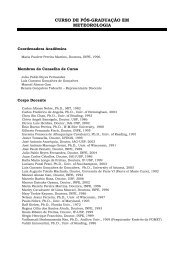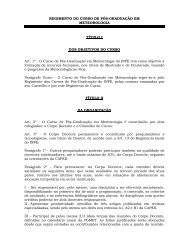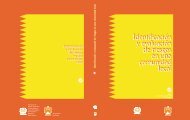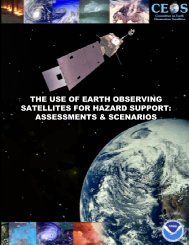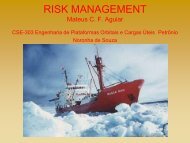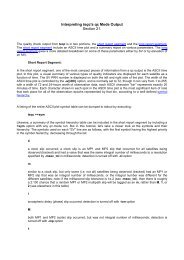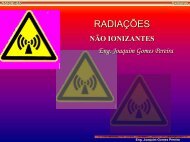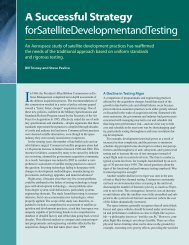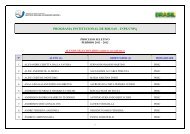Living with Risk. A global review of disaster reduction initiatives
Living with Risk. A global review of disaster reduction initiatives
Living with Risk. A global review of disaster reduction initiatives
You also want an ePaper? Increase the reach of your titles
YUMPU automatically turns print PDFs into web optimized ePapers that Google loves.
4<br />
<strong>Living</strong> <strong>with</strong> <strong>Risk</strong>: A <strong>global</strong> <strong>review</strong> <strong>of</strong> <strong>disaster</strong> <strong>reduction</strong> <strong>initiatives</strong><br />
Future challenges and priorities<br />
challenges<br />
The wide range <strong>of</strong> selected information services<br />
and program <strong>initiatives</strong> described above provide<br />
a basis to identify primary areas for future<br />
improvements in information management and<br />
the communication <strong>of</strong> experience in <strong>disaster</strong><br />
risk <strong>reduction</strong>. Five key areas are identified:<br />
• Availability <strong>of</strong> information<br />
• Necessary capacities to utilize data<br />
• Clearing house responsibilities<br />
• Expanded access to information<br />
• Future technology<br />
Availability <strong>of</strong> information<br />
There is currently abundant information,<br />
available <strong>global</strong>ly, on <strong>disaster</strong> risk <strong>reduction</strong><br />
but that does not necessarily translate into its<br />
widespread availability, nor is it particularly<br />
well targeted for all potential users. In many<br />
places and cultures there is little relevant information<br />
conveyed that is suited to local languages<br />
or the actual living conditions <strong>of</strong> people<br />
exposed to natural hazards.<br />
The very abundance <strong>of</strong> information also creates<br />
a problem for non-specialized or public<br />
users to ascertain the relative value or quality <strong>of</strong><br />
specific information, if they are unaware <strong>of</strong> the<br />
originating source or broader pr<strong>of</strong>essional context<br />
<strong>of</strong> the various sources.<br />
Useful information demands that databases be<br />
kept current, bibliographic resources be continually<br />
expanded, and that access and search<br />
criteria should remain consistent and be widely<br />
understood by an expanding user group.<br />
Necessary capacities to utilize data<br />
Frequent observations are made by individual<br />
country authorities about the inadequacy <strong>of</strong><br />
many institutions that frustrate their desire to<br />
know exactly what relevant information exists,<br />
where to find it, and how to access it in the<br />
most efficient manner.<br />
A priority initiative <strong>of</strong> considerable benefit<br />
would be the joint conduct <strong>of</strong> a national audit<br />
about risk-related information needs, availability<br />
and limitations. International organizations<br />
could help by providing guidance about existing<br />
sources or means for obtaining well-suited<br />
information.<br />
The engagement <strong>of</strong> existing regionallyfocussed<br />
information centres such as CRED,<br />
CARDIN, ADPC, ADRC, and the University<br />
<strong>of</strong> Colorado’s Natural Hazard Center, and<br />
the use <strong>of</strong> their experience in linking suppliers<br />
<strong>of</strong> information <strong>with</strong> practitioners would be particularly<br />
valuable.<br />
Clearing house responsibilities<br />
There is a glaring need for an international<br />
capacity to fulfil clearing house functions<br />
specifically related to the identification, ordering<br />
and dissemination <strong>of</strong> hazards and <strong>disaster</strong><br />
risk-management information. The intended<br />
role is one that could foster the exchange <strong>of</strong> relevant<br />
information through the use <strong>of</strong> lists <strong>of</strong><br />
lists, directories, and catalogue/search/<br />
retrieve/deliver procedures that would serve to<br />
direct and connect a very wide range <strong>of</strong> users<br />
and practitioners for all policy-making levels.<br />
Such facilities exist but concentrate on international<br />
<strong>disaster</strong> response or <strong>disaster</strong> preparedness,<br />
such as ReliefWeb and GDIN.<br />
The ISDR secretariat is working in association<br />
<strong>with</strong> partners, and is in the process <strong>of</strong> strengthening<br />
its web site and resource centre to build<br />
a comprehensive and easily accessible series <strong>of</strong><br />
directories and linkages that can form the basis<br />
<strong>of</strong> an approach to such a <strong>global</strong> clearing house<br />
function for <strong>disaster</strong> <strong>reduction</strong>.<br />
By pursuing the issue <strong>global</strong>ly, the existence <strong>of</strong><br />
primary information gaps, the inadequacy <strong>of</strong><br />
relevant data, or geographical shortfalls in<br />
information availability or dissemination may<br />
be more easily identified and addressed. Such a<br />
coordinated approach can also, <strong>with</strong> adequate<br />
176



